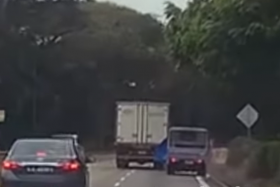Vehicle ban 'can help tackle terror attacks'
Security experts welcome move to fully pedestrianise Singapore's top shopping precinct
A fully pedestrianised Orchard Road will not only inject vibrancy into the iconic shopping street but could provide an added advantage in terms of national security.
Aon Risk Solutions, a risk-management agency, believes that making Orchard Road vehicle-free could make it safer against terrorists using vehicles to wreak carnage.
Releasing its 2017 Terrorism and Political Violence map last week, the agency said global terrorist attacks had gone up by 14 per cent last year, a trend it believes will continue this year.
Trucks were used in high-profile terrorist attacks in Nice, France, and Berlin, Germany, last year.
And vehicles, such as the SUV in the Westminster attack in London and the truck in Stockholm, Sweden, were the single most lethal form of attack for the first time this year in Western countries.
Minister for Trade and Industry (Industry) S. Iswaran told a tourism industry conference on Thursday that Orchard Road could become fully pedestrianised in the future to attract more shoppers to its malls.
For starters, the road could lose a lane to expand its pedestrian spaces.
On the same day, Mr Julian Taylor, Aon's broking strategist and head of crisis management, Asia, told The New Paper: "Vehicle attacks have gained traction across the globe because they can be conducted without using a network, making it very difficult for the security services to predict and negate."
He sees the plan to pedestrianise Orchard Road as part of the steps being taken to tackle the threat of vehicular attacks here.
Companies that use heavy vehicles told TNP that it would not be easy to completely safeguard them from being used to wreak havoc.
Mr Raymond Goh, the co-partner of CK Vehicle Rental, which has a fleet of lorries and vans, said: "The risk is definitely there. It's just a time-bomb waiting to happen."
Mr Liang Yiyong, operations manager of Heng Lim Transport, which rents out lorries, trailers and lorry cranes, said: "I don't think there's much we can do about it, except for the drivers to be responsible and vigilant about the safety of their vehicles."
His company uses a GPS tracking system for its 20-odd vehicles.
A spokesman for SembWaste, which uses heavy vehicles to collect waste and recyclables, said: "Our company's trucks are equipped with technology to prevent unauthorised personnel from starting or operating them, and all trucks are fitted with cameras and GPS trackers."
The companies contacted by TNP said they had not received security alerts or instructions from the authorities regarding their vehicles.
Security experts said there is a high likelihood of vehicles being used in terror attacks here because they are easy to carry out.
HARD TO DETECT
Associate Professor Kumar Ramakrishna, head of policy studies and coordinator of the National Security Studies Programme at the S. Rajaratnam School of International Studies (RSIS), said: "There can be physical measures such as bollards and cordoning off pedestrianised areas, but in general, they (the attack vehicles) are hard to detect.
"They require less expertise than bomb-making but can still cause mass casualties."
Mr Andrin Raj, South-east Asia regional director for the International Association for Counter-Terrorism and Security Professionals, said that companies must come up with strict rules to address potential situations where a vehicle can be stolen.
Dr Rohan Gunaratna, who heads the International Centre for Political Violence and Terrorism Research in RSIS, said: "Vehicle-ramming attacks are one of the most likely modes of attack in the region, including Singapore.
"It is essential to secure public events where crowds gather and present an attractive target for such attacks."
Mr Taylor said: "We are in an age where security and the protection of loved ones are not the prerogative of the security services. Everyone has a part to play, which is why the SG Secure phone app is one of many ways individuals can help to protect Singapore."
FOR MORE, SEE
More measures against vehicle threats
Over the past year, the Home Team has enhanced its capabilities to prevent and respond to terror attacks by better equipping its response forces and improving its surveillance and analytics abilities.
"However, as attacks around the world have shown, it is not possible to completely prevent such attacks," a Ministry of Home Affairs (MHA) spokesman said in reply to queries by The New Paper, adding that this is a challenge faced by security agencies globally.
MHA advises companies with heavy vehicles and drivers to:
- Secure the premises where vehicles are stored to prevent unauthorised entry, using measures such as perimeter fencing and CCTV cameras.
- Drivers should never leave their vehicles and keys unattended.
- Companies with fleet management systems that track their vehicles' location should investigate any unusual movement, including unapproved use of vehicles by employees. They should notify the police immediately if they notice anything suspicious, or if vehicles are missing or stolen.
MHA is also doing more to ensure events and buildings are protected against terror attacks through legislative amendments, the spokesman said.
The Public Order Act was amended recently to require organisers of large or higher-risk events to ensure necessary security measures, such as physical barriers to prevent vehicle-borne threats.
A new Infrastructure Protection Act will be introduced later this year to require new large-scale developments to include security measures at the design stage.
These may also include measures against vehicle-borne threats, the spokesman said.
The Act may also require owners of premises to adopt additional protective measures, such as bag checks, during heightened security climates.
Get The New Paper on your phone with the free TNP app. Download from the Apple App Store or Google Play Store now



